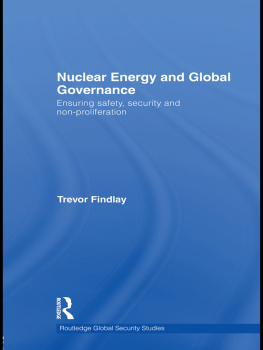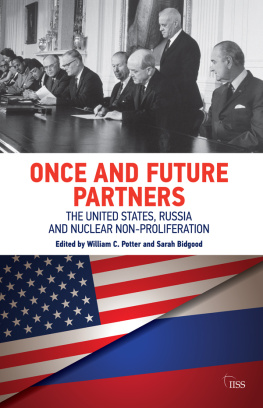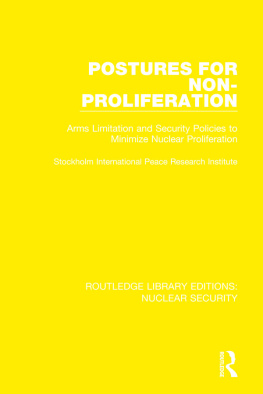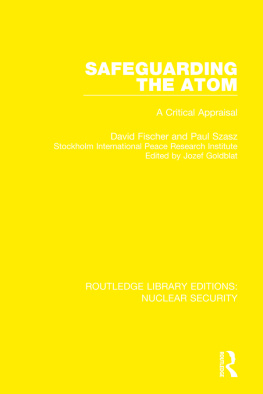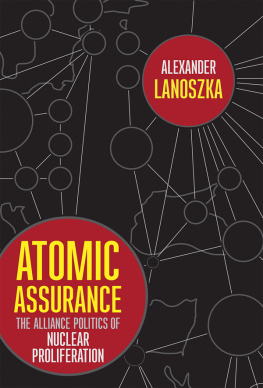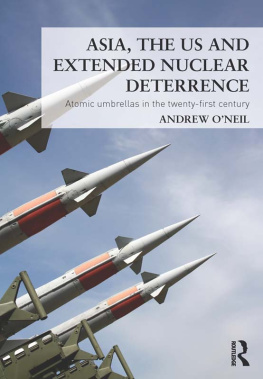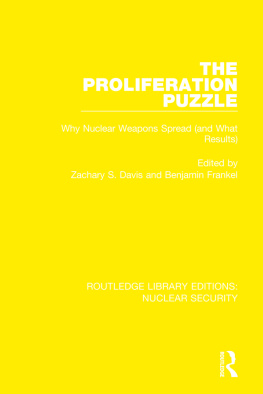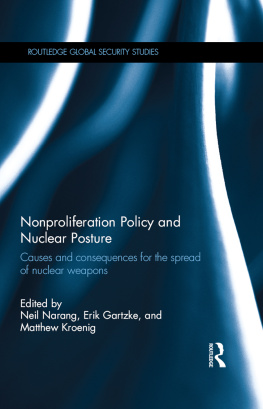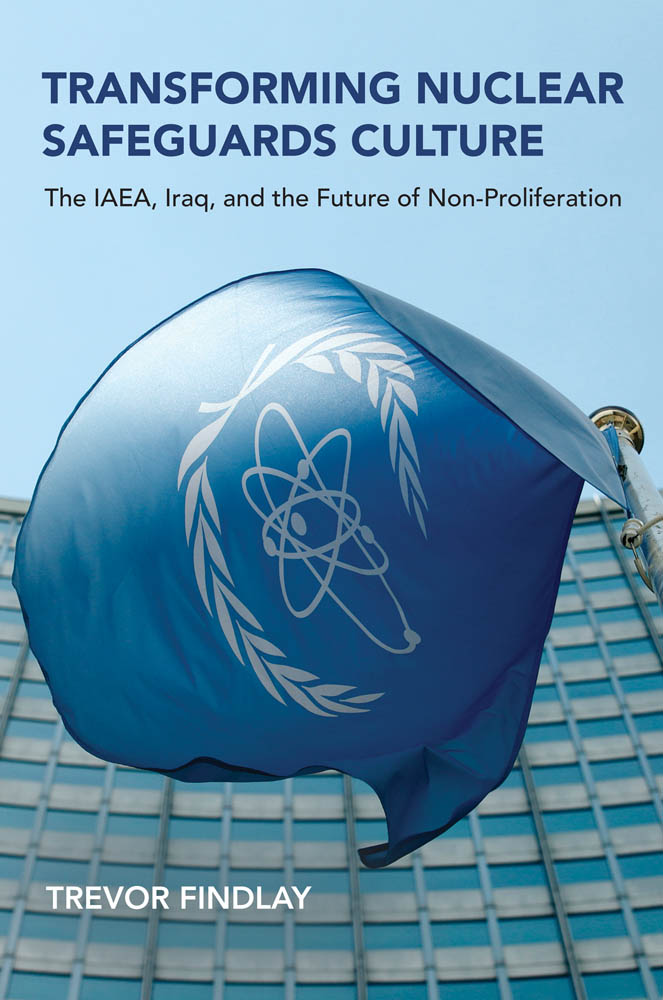
Transforming Nuclear Safeguards Culture
The Belfer Center Studies in International Security book series is edited at the Belfer Center for Science and International Affairs at the Harvard Kennedy School and is published by the MIT Press. The series publishes books on contemporary issues in international security policy, as well as their conceptual and historical foundations. Topics of particular interest to the series include the spread of weapons of mass destruction, internal conflict, the international effects of democracy and democratization, and U.S. defense policy.
A complete list of Belfer Center Studies in International Security books appears at the back of this volume.
Transforming Nuclear Safeguards Culture
The IAEA, Iraq, and the Future of Non-Proliferation
Trevor Findlay
Belfer Center Studies in International Security
The MIT Press
Cambridge, Massachusetts
London, England
2022 Belfer Center for Science and International Affairs
All rights reserved. No part of this book may be reproduced in any form by any electronic or mechanical means (including photocopying, recording, or information storage and retrieval) without permission in writing from the publisher.
Library of Congress Cataloging-in-Publication Data
Names: Findlay, Trevor, 1951 author. | Project on Managing the Atom (Harvard University), sponsoring body.
Title: Transforming nuclear safeguards culture : the IAEA, Iraq, and the future of non-proliferation / Trevor Findlay.
Other titles: Belfer Center studies in international security.
Description: Cambridge, Massachusetts : The MIT Press, 2022. | Series: Belfer Center studies in international security | This study is a product of the Project on Managing the Atom (MTA) at the Belfer Center for Science and International Affairs at Harvard University. The research was funded by the Carnegie Corporation of New YorkPreface. | Includes bibliographical references and index.
Identifiers: LCCN 2021046104 | ISBN 9780262543736 (paperback)
Subjects: LCSH: International Atomic Energy Agency. | Nuclear nonproliferationIraq. | Nuclear energySecurity measuresIraq. | Nuclear industrySecurity measuresIraq. | Nuclear industryIraq. | Nuclear weaponsIraq.
Classification: LCC JZ5675 .F56 2022 | DDC 327.1/747dc23/eng/20211210
LC record available at https://lccn.loc.gov/2021046104
d_r0
Contents
Chapter 1
Figure 1.2.Tuwaitha: Clandestine Nuclear Weapons Activities.
Chapter 2
Chapter 3
Figure 3.1.The Institutional Context of Safeguards Culture.
Figure 3.2.The IAEA Safeguards Community.
Chapter 4
Chapter 5
ABACCArgentine-Brazilian Agency for Accounting and Control
ACDAU.S. Arms Control and Disarmament Agency
C&SContainment and Surveillance
CSAComprehensive Safeguards Agreement
CTBTComprehensive Nuclear Test Ban Treaty
CTBTOComprehensive Nuclear Test Ban Treaty Organization
CWCChemical Weapons Convention
DDGIAEA Deputy Director General
DPRKDemocratic Peoples Republic of Korea (North Korea)
EAECEuropean Atomic Energy Community (also EURATOM)
ECOSOCUN Economic and Social Council
EMISElectro-Magnetic Isotope Separation
ESARDAEuropean Safeguards Research and Development Association
EURATOMEuropean Atomic Energy Community (also EAEC)
ExPoIAEA Office of External Relations and Policy Coordination
FAOUN Food and Agriculture Organization
GAOU.S. General Accountability (formerly Accounting) Office
HEUHighly-enriched uranium
IAECIraq Atomic Energy Commission
IAEAInternational Atomic Energy Agency
ICAOInternational Civil Aviation Organization
ICNNDInternational Commission on Nuclear Non-Proliferation and Disarmament
IMOInternational Maritime Organization
INFCEInternational Fuel Cycle Evaluation
INFCIRCIAEA Information Circular
INMMInstitute of Nuclear Materials Management
INPOInstitute of Nuclear Power Operations
INVOIraq Nuclear Verification Office
ISOInternational Organization for Standardization
ITUInternational Telecommunication Union
JCPOAJoint Comprehensive Plan of Action
JIUUN Joint Inspection Unit
kWKilowatt/s
kW(th)Kilowatt/s (thermal)
LEULow-enriched uranium
MWMegawatt/s
MW(th)Megawatt/s (thermal)
NAMNon-Aligned Movement
NASAU.S. National Aeronautics and Space Administration
NEAOECD Nuclear Energy Agency
NGONon-Governmental Organization
NNWSNonNuclear Weapon State/s
NPTNuclear Non-Proliferation Treaty
NRCU.S. Nuclear Regulatory Commission
NTMNational Technical Means
OECDOrganization for Economic Cooperation and Development
OMVOngoing Monitoring and Verification (Iraq)
OPCWOrganization for the Prohibition of Chemical Weapons
OTAU.S. Office of Technical Assessment
QMSQuality Management System
RSACRegional System/s of Accounting and Control
SACIAEA Scientific Advisory Committee
SAGSIIAEA Standing Advisory Group on Safeguards Implementation
SALIAEA Safeguards Analytical Laboratory
SEERTState-Level Effectiveness Evaluation Review Team
SEGState Evaluation Group
SIPRIStockholm International Peace Research Institute
SIRSafeguards Implementation Report
SLAState-Level Approach
SLCState-Level Concept
SQPSmall Quantities Protocol
SSACState System/s of Accounting for and Control of Nuclear Material
TCTechnical Cooperation (IAEA)
UNAECUN Atomic Energy Commission
UNESCOUN Educational, Scientific and Cultural Organization
UNMOVICUN Monitoring, Verification and Inspection Commission
UNSCUN Security Council
UNSCOMUN Special Commission
UNSCRUN Security Council Resolution
VCDNPVienna Center for Disarmament and Non-Proliferation
VERTICVerification Research, Training and Information Center
VICVienna International Center
WiNWomen in Nuclear
WINSWorld Institute for Nuclear Security
WMDWeapon/s of Mass Destruction
T his study is a product of the Project on Managing the Atom (MTA) at the Belfer Center for Science and International Affairs at Harvard University. The research was funded by the Carnegie Corporation of New York. The project was stimulated by the growing international interest in nuclear safety and security cultures and the likelihood that similar cultural concepts could also be applied to nuclear safeguards. It was also prompted by reports that the International Atomic Energy Agency (IAEA) had sought to change its safeguards culture after the Iraqi non-compliance case of the early 1990s revealed the shortcomings of its safeguards system.
I began research for this project by reviewing the general literature on organizational culture and consulting management theory experts. Professor John Carroll, Morris A. Adelman Professor of Management at the Massachusetts Institute of Technologys Sloan School of Management, was of great assistance in helping me understand the finer points of organizational culture theory. I then conducted archival and current documentary research on the origins of IAEA safeguards culture and its evolution since the Iraq case. One challenge in pursuing such research is that the IAEA Secretariat does not publicly report to its member states the details of its organizational, management, or personnel changes. The analysis in this book is necessarily hampered by such constraints.
Next page

